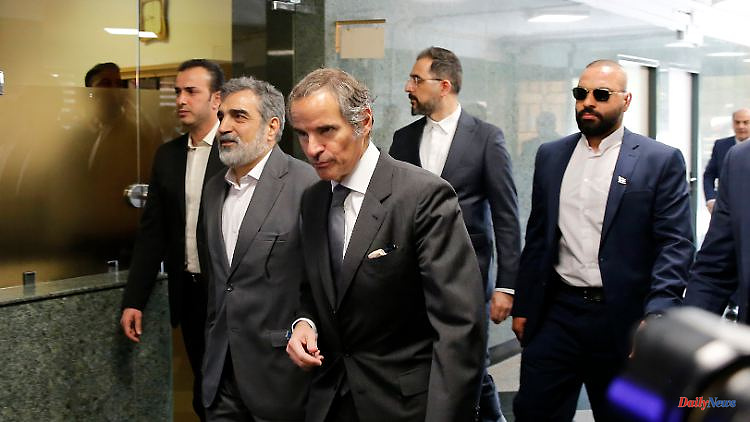The IAEA is alarmed: The negotiations with Iran about the nuclear agreement are on ice, highly enriched uranium has recently been discovered. Now the IAEA chief is traveling to the Islamic Republic for the first time in a long time to find out how close Tehran is to nuclear weapons.
According to IAEA Director General Rafael Grossi, there is a cooperative atmosphere in the nuclear talks with Iran. Grossi described it in Tehran as "an atmosphere of work, honesty and cooperation". The dialogue continues, he said during a joint press conference with Iran's nuclear chief Mohammed Eslami.
Grossi traveled to Iran after IAEA inspectors found traces of uranium with a purity of almost 84 percent at a nuclear facility in Fordow. A degree of purity of around 90 percent is required for nuclear weapons. The IAEA wants to clarify whether the high degree of enrichment was deliberately brought about or whether it is an unintended outlier, as Iranian representatives argue.
Israel and the USA in particular have recently expressed their concern that Iran could use the uranium to develop and build nuclear weapons. Iran's nuclear chief said a plan had been drawn up with the IAEA to clarify the open issues. "We hope that Grossi's visit will lead to professional cooperation in the future," said Eslami. According to him, Iran does not enrich uranium above 60 percent purity.
In Vienna in 2015, Iran committed to restricting its nuclear program. In return, UN sanctions affecting the Iranian energy and banking sectors, among other things, were lifted. The pact was intended to prevent the country from developing nuclear weapons. After the United States withdrew from the agreement in 2018 under then-President Donald Trump, Tehran reversed the restrictions.
The Vienna Agreement allows Iran to produce a limited amount of uranium with a low purity of less than four percent, for example as reactor fuel. However, only one enrichment plant at the Natans nuclear facility may be operated with a limited number of centrifuges. In return, Iran allowed close IAEA controls in the agreement. Since 2019, however, Iran has gradually violated the requirements, including producing 60 percent uranium in an underground plant in Fordow. In addition, part of the IAEA surveillance equipment was dismantled. Negotiations on the agreement have not made any significant progress since May 2022.
Iran's nuclear chief Eslami has now announced an international nuclear conference in Tehran. According to Western diplomats, Grossi is negotiating in Tehran, among other things, about more intensive IAEA inspections in nuclear plants, after Iran had recently increased the enrichment of uranium more and more. According to information from Tehran, in addition to the inspections, the negotiations are also about a dispute over the previously unexplained origin of traces of radioactive material at three locations in Iran. Iran's political leadership is demanding that differences be settled.
It is unclear how close Iran is to building a nuclear bomb. According to IAEA chief Grossi, Tehran has enough uranium for several nuclear weapons if current stocks were to be further enriched. Since enrichment proceeds along an exponentially increasing curve, 60 percent material can be brought up to 90 percent very quickly. However, it was "a long and politically difficult road to the development of a nuclear weapon," Grossi said in the EU Parliament in January.
In late February, CIA chief William Burns said that US foreign intelligence currently had no evidence that Iran had decided to resume its military nuclear program. Should Tehran go down this route, it would take at least a year to complete a nuclear weapon, a senior European diplomat said this week. In any case, the IAEA is convinced that, despite limited inspections, it will be able to discover weapons-grade uranium within a short time and thus give the international community time to take countermeasures.












